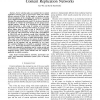Free Online Productivity Tools
i2Speak
i2Symbol
i2OCR
iTex2Img
iWeb2Print
iWeb2Shot
i2Type
iPdf2Split
iPdf2Merge
i2Bopomofo
i2Arabic
i2Style
i2Image
i2PDF
iLatex2Rtf
Sci2ools
120
click to vote
TON
2008
2008
A comparative analysis of server selection in content replication networks
Server selection plays an essential role in content replication networks, such as peer-to-peer (P2P) and content delivery networks (CDNs). In this paper, we perform an analytical investigation of the strengths and weaknesses of existing server selection policies, based initially on an M/G/1 Processor Sharing (PS) queueing-theoretic model. We develop a theoretical benchmark to evaluate the performance of two general server selection policies, referred to as EQ DELAY and EQ LOAD, which characterize a wide range of existing server selection algorithms. We find that EQ LOAD achieves an average delay always higher than or equal to that of EQ DELAY. A key theoretical result of this paper is that in an N-server system, the worst-case ratio between the average delay of EQ DELAY or EQ LOAD and the minimal average delay (obtained from the benchmark) is precisely N. We constructively show how this worst-case scenario can arise in highly heterogeneous systems. This result, when interpreted in the ...
EQ DELAY | EQ LOAD | Server Selection | TON 2008 |
Related Content
| Added | 15 Dec 2010 |
| Updated | 15 Dec 2010 |
| Type | Journal |
| Year | 2008 |
| Where | TON |
| Authors | Tao Wu, David Starobinski |
Comments (0)

